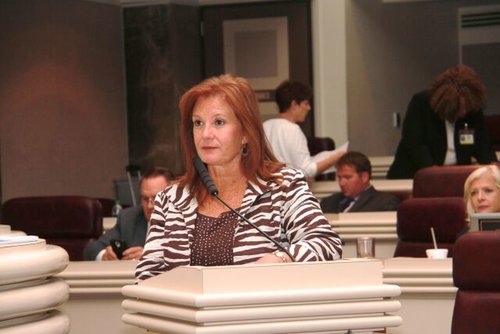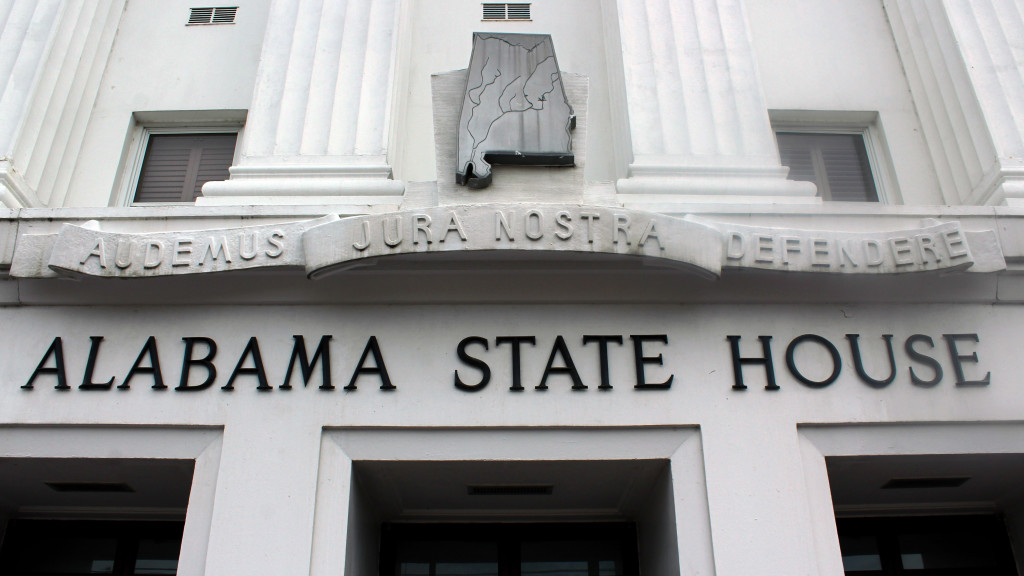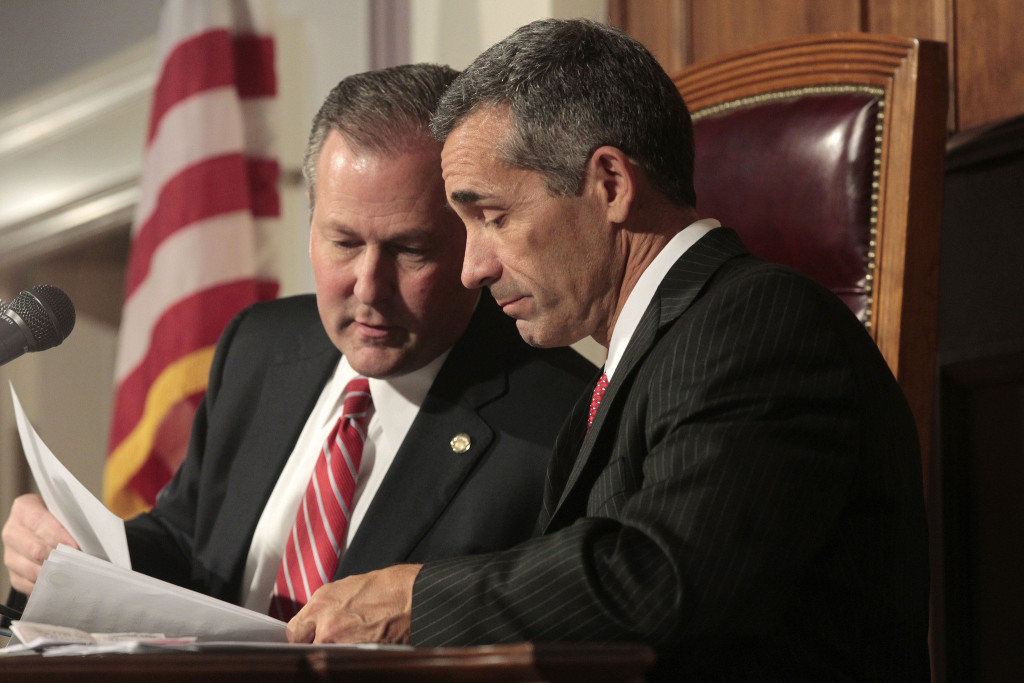Terri Collins: Legislature passes more than two dozen bills to improve public education outcomes across Alabama

Often lost among the more provocative and controversial bills that generate headlines and hullabaloo during legislative sessions are the solid policy measures designed to address long-standing problems endemic to state government. As the chair of the House Education Policy Committee, I can attest that we passed more than two dozen bills and measures to support our teachers and administrators, improve classroom instruction, and increase test scores and outcomes in a variety of subjects. For the fourth consecutive year, the Legislature approved an Education Trust Fund budget with record funding, which, at $8.3 billion, makes historic investments in K-12 public schools, community colleges, and public four-year institutions, and each of these record budgets have been implemented without having to declare the painful, mid-year budget cuts known as proration. It is important to note, in fact, that proration occurred on an average of every other year when Democrats controlled the Legislature, but as a result of responsible budgeting practices that have since been put in place, proration has been avoided in each of the dozen years under Republican leadership. A generation of students and teachers will soon avoid experiencing the chaos that accompanies prorating the budget. Included within the budget were the most generous pay raises awarded to public school educators in decades. Like other states across the nation, Alabama is experiencing a dramatic shortage of classroom teachers, so pass both targeted pay raises for new instructors and substantial salary increases for veteran educators in order o help us recruit, retain, and re-entice desperately needed personnel. Additional incentives, such as improved retirement benefits and loan forgiveness, were also enacted in order to attract teachers to particularly difficult-to-staff subjects like math and science and to geographic areas where the need is the greatest. Funding increases for the Alabama Reading Initiative, commonly known as ARI, and the Literacy Act, two innovative programs designed to increase reading scores across the state; the Alabama Math, Science, and Technology Initiative; and the state’s nationally-recognized “First Class” pre-kindergarten program, which is the model for our new emphasis on funneling auxiliary teachers into K-3 classrooms, were included in the budget, as well. Recognizing the need to focus laser-like attention upon increasing math scores across the state, an entirely new education program was also created and funded by the Legislature. Recent standardized test results revealed that Alabama currently ranks 52nd in the nation in math scores, a particularly embarrassing statistic when you consider that there are only 50 states in the union. Only 22% of Alabama students were proficient in math on the 2021 ACAP state assessment, including only 11% of low-income students and 7% of black students. In addition, 28 K-5 schools in Alabama currently have ZERO percent of students proficient in math. A state that designed the rockets that took men to the moon and today houses factories that rely upon advanced engineering to manufacture state-of-the art automobiles, airplanes, and weaponry must not be content for its students to wallow at the bottom of math skills. The newly-created Numeracy Act will follow the model set by proven successful programs like ARI and the Alabama Literacy Act in order to concentrate educational resources on an obvious problem in need of addressing. Much like ARI raised reading scores statewide by placing specially-trained reading coaches in public schools, the Numeracy Act will locate specially-trained math coaches in areas where they are needed. It also allows the State Department of Education to intervene in schools that continue to perform below expected levels even after additional educational resources are put in place. A new Office of Mathematics Improvement within the State Department of Education will be tasked with ensuring that students are at or above grade-level proficiency in math by the fifth grade, and it will be held accountable for results. As part of the first major overhaul and reform of state mental health services since Gov. Lurleen Wallace’s administration, the Legislature passed a measure requiring each school system across Alabama to employ a mental health service coordinator. This effort goes hand-in-glove with the findings of the state’s Emergency Task Force on School Safety and Security that I chaired in response to a series of school shootings across the nation in 2018. The COVID-19 pandemic lockdown and at-home instruction for students that resulted certainly reinforced the importance of access to high-speed broadband Internet in rural Alabama. When circumstances force reliance on classes and instruction through Zoom and other technology services, no student should be left behind because necessary Internet access is unavailable in the area where they reside. Much progress has been and continues to be made in the effort, and the Legislature appropriated another $243 million to spur broadband expansion. Additional bills such as those related to Accountability Act scholarships, which allow children from low-income homes to escape failing schools for those that perform well; the textbook selection process; English language learners; public school registrations for transferring military families; cybersecurity; school construction; and others were also passed this session. While the media devotes the majority of headlines and spotlight to the measures that produce Internet clicks and provoke strong feelings among liberals and conservatives alike, please know that the House Education Policy Committee and my colleagues in the Legislature are constantly working to improve public education for students, teachers, and parents across the state. Alabama is a special place to live, work, worship, and raise a family, and taking our public schools to the next level will simply make an already great state even better. State Rep. Terri Collins (R – Decatur) was elected to represent Alabama’s House District 8 in 2010. She serves as chair of the House Education Policy Committee and holds a seat on the budget-writing committee for K-12 public schools, community colleges, and public universities.
Justin Bogie: State government takes more revenue from citizens than ever before

In 2021, Alabama’s state government took more money from taxpayers than ever before. The big question is, what will state government leadership do with it? It should be used to provide tax relief to citizens and businesses, not to continue to grow government. According to end of fiscal year, 2021 data from open.alabama.gov, the Education Trust Fund, and General Fund budgets took in a whopping $11.2 billion in revenue last year. That’s nearly $1.2 billion (11.6%) more than the state collected in the fiscal year 2020. Don’t forget, this is on top of nearly $4 billion that has and will continue to flow directly to state government because of a series of federal stimulus bills designed to help states recover from the COVID-19 pandemic. The state’s Legislative Services Agency recently estimated that almost $47 billion total has been given to the state from the federal government over the past two years. That includes money such as direct payments to individuals, payments to county and local governments, the Paycheck Protection Program for businesses, and expanded unemployment benefits, among others. While it is good that Alabama’s economy has seen a swift recovery from the pandemic, especially compared to states with more restrictive environments, much of that growth is coming directly out of your wallet. Individual income tax receipts rose by $631.6 million last year, an increase of 15 percent. Sales tax receipts rose by nearly 15 percent, or $372 million. The state’s recently implemented online sales tax had another big year, adding $72 million more in revenue, almost 40 percent growth. And it wasn’t just individuals bearing increased tax burdens. According to open.alabama.gov, corporate income tax receipts to the Education Trust Fund increased by 72.6 percent in 2021, more than $355 million in new revenue. While the numbers are important, don’t get lost in them. The point is that while the state is taking in record amounts of revenue, you, the citizen, as well as businesses that are the life-blood of the economy, are in turn paying more than ever before. 2021 is not an anomaly. Since the end of the Great Recession, Alabama’s economy has generally seen steady growth. Since fiscal year 2019 state government has enacted record-high budgets and seen more revenue each year. But what have lawmakers done for citizens and the business owners of Alabama? Instead of looking for ways to return their money to them, government has looked for new ways to tax and spend even more of your money. In 2019 the Legislature and Governor Kay Ivey enacted a gas tax that is projected to bring in over $300 million in new revenue this year. Lawmakers also allowed for the tax to be raised by an additional $.01 every two years without ever having to take another vote on the issue. The 2021 Regular Legislative Session was dominated by two other issues that are in no small part about bringing in more revenue. The Legislature was successful in legalizing medicinal marijuana, which could bring in tens of millions of dollars in sales tax revenue in the future. While combined gambling and lottery legislation failed again, its potential to bring hundreds of millions of dollars in annual revenue to the state means that it will likely come before lawmakers again. When asked recently about the latest revenue windfall, Senate education budget committee chairman Arthur Orr, R-Decatur, identified contributing to the education budget’s stabilization fund, teacher pay raises, bonuses for retired educators, and tax cuts for retirees and low-income families as priorities. While tax cuts should be the top priority, why not find a way to provide tax relief that will benefit almost all Alabamians, such as eliminating the sales tax on groceries? Alabama’s corporate income tax rate is higher than many neighboring states and is highly susceptible to changes in the federal tax code. Why not lower the rate and change the deduction structure so that Alabama’s business environment is more competitive with other southern states? Pay raises and bonuses are the default that lawmakers always seem to go to when there is extra money. This mentality is why state government continues to grow. When the state collects more revenue than projected, that means that it took more from your pocket than it needed. That money should be given back to you, not used to expand state government. Justin Bogie is the Senior Director of Fiscal Policy for the Alabama Policy Institute.
Kay Ivey signs legislation creating School of Cyber Technology and Engineering, Education Budget

Governor Kay Ivey on Monday signed into law a pair of bills SB212 and SB175, which creates the Alabama School of Cyber Technology and Engineering and funding the 2019 education budget, respectively. SB212: Alabama School of Cyber Technology and Engineering Sponsored by Decatur-Republican State Sen. Arthur Orr and Huntsville-Democrat, House Democratic Leader State Rep. Anthony Daniels, SB212 creates the Alabama School of Cyber Technology and Engineering in Huntsville. The school will be an independent, residential school that is established for academically-motivated and gifted Alabama students with educational opportunities and experiences in the rapidly growing fields of cyber technology and engineering. The school will also assist teachers, administrators, and superintendents across the state in replicating cyber technology and engineering studies in their own schools. “The Alabama School of Cyber Technology and Engineering will prepare some of our state’s highest-achieving students to enter the growing fields of cyber technology and engineering,”Ivey said. “Just as Huntsville has always been on the leading edge of the rocket and aerospace industries, the Alabama School of Cyber Technology and Engineering will ensure that Alabama students are at the forefront of today’s emerging technologies.” Orr said he envisions students from across the country wanting to relocate and attend the school. “I see the school as a real magnet for gifted students not only from all over the state, but also from across the country who may want to relocate here to be able to access such a world class, cutting-edge education in the fields of cyber and engineering. The graduates of the school will be long term contributors to this state’s growth in these emerging areas,” explained Orr. “Today is an important day for Huntsville, our state and, most importantly, our young people. In addition to continuing to grow our reputation as an emerging hub in the tech and cybersecurity industry, this school will provide our students the opportunity to become the next generation of innovators by giving them a jump-start on careers in technology, engineering, and protecting our nation’s cyberinfrastructure,” added Daniels. The Huntsville/Madison County Chamber of Commerce was instrumental in coordinating efforts between the Chamber, Cyber Huntsville and the Alabama School of Cyber and Engineering Foundation. “We are pleased that the vision for an Alabama cyber technology and engineering magnet school has been acted upon by our state leaders,” said Alicia Ryan, Vice President of the Cyber Huntsville Board and President of the Alabama School of Cyber and Engineering Foundation. “This school will provide a wonderful opportunity for students from across Alabama to get early exposure to new STEM-based curriculum that will prepare them for exciting cyber and engineering career paths. By enabling unique educational opportunities today, we are building our workforce for the future.” A location for the school has yet to be selected. The legislation allows for the school to open and formally begin operation during the fall semester of 2020. SB175: Education Budget Ivey also signed the Education Budget on Monday, which was also sponsored by Decatur-Republican State Sen. Arthur Orr along with Tuscaloosa-Republican and Committee chair state Rep. Bill Poole. The 2019 budget provides a historic level of funding for all aspects of the state’s education system. It also includes a 2.5 percent raise for all education employees. “I am proud to have worked closely with the Legislature to pass a historic Education Budget which gives a raise to our teachers and school employees, increases funding for our voluntary Frist-Class Pre-K Program and provides more opportunities for higher-education students across Alabama,” Ivey commented. “I am committed to improving education in Alabama for everyone, regardless of where they live or the economic resources available to them.” The Education Trust Fund Budget is the largest investment in education in a decade, and was passed with overwhelming bipartisan support. “Alabama’s teachers and education support staff have an important task – educating our children – our children who are the key to our state’s success,” Ivey added. “It is important that we attract the best people possible to work in our education system and this pay raise will help us do that.” The budget covers the fiscal year 2019 which begins in October.
Alabama education budget moves one step closer to Kay Ivey’s desk

Alabama legislators moved one step closer to sending the Education Trust Fund budget to Gov. Kay Ivey’s desk on Tuesday. Lawmakers in the State House gave final approval to the conference committee report on HB175, a $6.6 billion education budget for Fiscal Year 2019, which starts October 1 on a 98 to 0 vote. It is the largest education budget for Alabama’s schools since the great recession of 2008. The funding includes a 2.5 percent pay raise for teachers. The measure now moves to the State Senate for final approval, before it could be sent to Ivey’s desk to be signed into law.
Del Marsh, Arthur Orr seek accountability for higher education spending

Facing a perennial budget shortfall, the Alabama Legislature is forced to consider how to best spend each and every hard-earned taxpayer-dollar each year. Which is exactly why Anniston-Republican Sen. Del Marsh and Decatur-Republican Sen. Arthur Orr submitted a plan in the Alabama Legislature that seeks to establish greater accountability for the state’s higher education spending by creating the Alabama Community College Council on Outcome-Based Funding. The council would be tasked with rethinking the current postsecondary funding model and create a plan to shift to outcome-based funding for Alabama’s community colleges. Like many state across the country, Alabama currently allocates funds on the basis of enrollment, which by-and-large ensures equitable distribution of per-student spending across institutions. Essentially, dollars follow students high school to higher education. But the current system doesn’t always take in account whether or not students complete their college courses, transfer to other institutions, or even graduate. Which is why Marsh and Orr are hoping to change the system to one where dollars don’t simply follow students, but rather they follow successful students, by shifting the funding to what educators call an outcome-based or performance-based system. Switching to an outcome-based system, endeavors to ensure taxpayer investments yield the best possible returns as they incentivize not only college access, but also college completion “The goal here is to bring more accountability to taxpayer dollars that are spent by higher education institutions,” Orr remarked. “The Legislature appropriates over $1.5 billion annually to Alabama’s colleges and universities, and we need a mechanism for rewarding those institutions that are providing great value to Alabama’s students.” According to the plan set forth — Senate Joint Resolution 85 — an advisory council will develop a specific outcome-based funding model for the allocation of Education Trust Fund appropriations to publicly-supported community and technical colleges in Alabama. “Making government more accountable to the taxpayers is a top priority of the Alabama Legislature,” Marsh said. “We are committed to making any changes necessary in order to achieve that goal.” Alabama isn’t the only state looking to make a change. Across the country, other budget-strapped states have been forced to carefully consider how their limited dollars are spent on higher education. Currently, thirty-two states — including neighbor-states Florida, Georgia, and Tennessee — now use, or are in the process of transitioning to performance-based formulas to determine higher education spending. “Historically, many colleges have received state funding based on how many full-time equivalent students are enrolled at the beginning of the semester,” said the National Conference of State Legislatures. This model provides incentives for colleges to enroll students and thus provide access to postsecondary education, but this model does not necessarily provide incentives for institutions to help students successfully complete degree programs. Many states are reconsidering the enrollment-based funding model and instead are aligning funding models with state goals and priorities.” Pending what the advisory council puts together, Alabama could be poised to join them soon. A shift in process could not only help the state’s ongoing budget crisis, but also bolster state’s higher education graduation rate. Only 23.5 percent of Alabamians between the ages of 25 and 64 have an associate’s degree or better. In comparison, 40.4 percent of Americans in the same demographic do, according to the U.S. Census Bureau’s 2011-2015 data. “This process is in line with our vision of providing all Alabamians with an affordable pathway to succeed through quality education and training,” said Jimmy Baker, Chancellor of the Alabama Community College System. “We look forward to working with the Legislature to create a funding model that ensures we are accountable with every dollar provided to us and shows the successes of our students.” According to SJR85, “the advisory council shall report its findings, conclusions, and recommendations to the Governor, the Chair of the House Ways and Means Education Committee, and the Chair of the Senate Finance and Taxation Education Committee not later than January 1, 2018” to be considered during the 2018 Legislative Session.
Alabama legislative wrap-up: April 11–15, 2016

Here’s your quick look at some of the major votes the Alabama House of Representatives and the Alabama Senate took this week: On Tuesday the Alabama Senate overwhelmingly passed SB 347, a bill legalizing the research and regulation of industrial hemp—the non-intoxicating version of the cannabis plant. A similar, but not identical, bill passed the Alabama House earlier in the day. To be sent to the governor’s desk the bill must make it through the conferencing process. On Wednesday a proposal to add an amendment to the state constitution that would keep GreeneTrack’s bingo casino operational narrowly failed. The amendment, sponsored by Sen. Bobby Singleton, a Greensboro Democrat, was shot down four votes shy of the necessary 21. The Alabama Senate passed Wednesday evening the Education Trust Fund budget, funding education in the state, as well as the first pay raise for teachers in several years. In the largest education budget from the state since 2008’s financial crash which sent the state’s budgets careening, the $6.3 billion expenditure funds everything from K-12 public classrooms to the implementation of new educational technology. The Alabama legislature nearly unanimously passed a new funding formula for the state’s roads and bridges Wednesday evening, in what legislators and outside groups are celebrating as a return to greater local control of transportation funds. The bill, SB 180, establishes the Alabama Transportation Safety Fund, which will receive revenues designated for “maintenance, improvement, replacement, and construction of state, county, and municipal roads and bridges within the state.”
Alabama Senate passes education budget, teacher pay raise

The Alabama Senate passed Wednesday evening the Education Trust Fund budget, funding education in the state, as well as the first pay raise for teachers in several years. In the largest education budget from the state since 2008’s financial crash which sent the state’s budgets careening, the $6.3 billion expenditure funds everything from K-12 public classrooms to the implementation of new educational technology. Senate President Pro Tem Del Marsh commended Sen. Arthur Orr (R-Decatur), the bill’s sponsor in the Senate, for his work in shepherding the legislation through the upper house, but said the state still has a long way to go in improving education. “Alabama is still 46th and 50th in reading and math, respectively, and only 16% of our high school graduates are college ready according to American College Testing (ACT),” Marsh said in a press release. “Education affects every part of this state and I cannot look of these numbers and accept the status quo. I am still committed to reforming our education system until there is noticeable improvement and all children are able to receive a high quality education. I look forward to working with those in the education community who share my concerns on new and innovative reforms for next year,” said Marsh. A separate bill will give 4 percent pay increases to teachers, educational staff, and administrators making less than $75,000 annually, as well as a 4 percent raise to all principals and assistant principals, and a 2 percent raise to other teachers and staff making above that amount. “They have not received a true pay raise since 2008,” said Orr. “Here we are looking at the 2017 budget. In education and most businesses, you have to attract good people, and the way to attract good people is how you compensate them. We need to compensate people in education accordingly to get the best that we can.” Though the original bill has already passed the House, it will likely be sent to a conference committee to reconcile small changes made during passage in the Senate.
Senate committee approves 4 percent teacher raise for Alabama teachers, education budget

An Alabama Senate committee has approved a 4 percent pay raise for most public school teachers, administrators and employees. The Senate Finance and Taxation Education Trust Fund Committee approved a $6.327 billion Education Trust Fund budget, a 5 percent increase over this year, which funds pay raises for teachers and provides additional money to hire new educators and fund transportation. The House unanimously approved the budget early last month. The budget provides for a wide-array of increases for state education, including $14.5 million to Alabama’s top-ranking Pre-K program — a bump from the House-approved $14 million. Further, the budget will fully fund the Public Education Employees Health Insurance Plan (PEEHIP) and bump the funding for teacher supplies from $373.79 to $405.05 per unit, and technology from $63.79 per unit to $169.34 per unit. The Committee also approved a proposal that dictates teachers and employees making less than $75,000 a year would see a four percent pay raise, while those above would see a two percent raise, making this the first take-home pay increase in years for Alabama public school teachers. The committee adopted an amendment offered by Senate budget chairman Arthur Orr (R-Decatur), that included principals and assistant principals in the pay raise. “Principals are the backbone of the schools, and make the trains run on time and we need to attract good leaders to our individual schools,” Orr said. The budget now moves to the full Alabama Senate, where it is expected to be considered as early as Wednesday.
$6.3B education budget with teacher pay raises clears Alabama House

In a surprising move, the Education Trust Fund budget cleared the Alabama House of Representatives Tuesday by a unanimous vote, clearing the way for a series of increases to state education funding. HB117 by Rep. Bill Poole (R-Tuscaloosa) comes in at roughly $6.3 billion and is the largest education budget passed since 2008. Next year’s budget is likely to come in at about 4.8 percent higher than this year’s, an increase of roughly $290 million. HB121, another bill from Poole which dictates that teachers making less than $75,000 a year should see a four percent pay raise, while those above see a two percent raise, also passed the House by a unanimous vote today. The budget provides for a wide-array of increases for state education, including $14 million to Alabama’s top-ranking Pre-K program. Further, the budget will fully fund the Public Education Employees Health Insurance Plan (PEEHIP) and provide an additional $9.8 million for transportation, $5 million for technology and $1.6 million for teachers’ supplies. The budget also increases funding for Other Current Expenses (OCE), money that school systems can use for additional needs, by $23.9 million. During a committee hearing last week, opponents of the bill voiced concerns over its failure to adequately address the needs of public libraries and the various programs they offer. Rep. Patricia Todd (D-Birmingham) over the bill’s use of roughly $109 million allocated for departments seemingly unrelated to education. Once approved by the Senate Committee on Education and Youth Affairs, the bill will go before the Senate and then on to the desk of Gov. Robert Bentley for final approval. Both chambers are still hoping to pass the Education Trust Fund and General Fund budgets before spring break, which begins March 21.
Proposed constitutional amendment would dictate how oil spill money can be spent

Rep. Randall Davis (R-Daphne) has introduced a bill which would propose an amendment to the Alabama Constitution to “provide for the distribution and use of certain payments received by the state from settlements and other monies.” HB360, known also as the Alabama Strategic Investment Initiative, would also require lawmakers to pass legislation creating an authority to issue revenue bonds using money from the Deepwater Horizon Oil Spill Disaster to fund bond payments. The bill would further require the distribution of such funds for specific purposes. The bill details that funds from the oil spill settlement can be used to repay the $161.5 million taken from the General Fund Rainy Day Account to prop up the General Fund. Further, funds can be used to supplement funds being allocated to Mobile and Baldwin counties, not to exceed $439 million, in the following manner: to the Department of Transportation to assist in completing the Highway 98 project, the I-10 to I-65 Beach Expressway project and the Rangeline Road Extension project. $50 million for the Strengthen Alabama Homes Fund, for “residential property owner grants to retrofit insurable property to resist loss due to hurricane, tornado, or other 22 catastrophic wind events.” Oil spill allocations in this fashion would be decreased if any additional funding, such as federal or local matching funds, and if any is left over it would be used to repay the money taken from the Education Trust Fund between 2013 and 2015. A recent move by Gov. Robert Bentley to use oil spill money to renovate a beach-side mansion has attracted the fury of some state lawmakers and, though it does not specifically mention those efforts, the bill does spell out how the money can be used and leaves little leeway for spending it otherwise. If approved by the legislature, the amendment could go to the public for a vote as early as November.
State education budget sees widespread support in committee hearing

The House Ways and Means Education Committee heard public remarks Wednesday regarding the Education Trust Fund budget. The budget, which centers on a bill sponsored by Rep. Bill Poole (R-Tuscaloosa), includes a series of bills that together create a package that addresses appropriations, pay raises and more. HB117 calls for, among other things, a $14 million increase in funding for Alabama’s top-ranking Pre-K program. The two-year increase in funding will amount to $24 million, bringing funding to the program to more than $60 million. The most significant increases in the education budget are reserved for K-12 programs, specifically a 4 percent pay raise for all public school employees making less than $75,000 annually. Those making over that threshold would receive a 2 percent salary increase. The bill calls for the full funding of the teachers’ retirement system and an additional $8 million for textbooks, whether hardback or digital. An additional $7 million dollars is being appropriated for transportation and an increase of $5 million for classroom technology, which will accompany the $12 million allocated via the WIRED Ahead Act. Employees with the community college system will see a 4 percent pay raise, as well a funding increase of $2 million for career technology, while university employees will receive a 1 percent pay raise. The committee members then allowed members of public, which nearly filled the meeting room on the main floor of the Statehouse, to speak for or against the measure. In all, more than 10 people spoke in favor of the measure, the majority of whom work in Pre-K and public library programs. Many of those who supported the legislation also rallied for increases to the Alabama Public Library System, noting that the program serves a wide array of students and adults through digital services. Once discussion on the budget completed, two people spoke up against HB121, also sponsored by Poole, which specifies the pay increase for public education employees. Susan Kennedy, Public Policy and Governmental Relations Manager for the Alabama Education Association, made perhaps the finest point on the need for Alabama teachers to receive a significant pay raise. Kennedy cited data showing that the rate of inflation has increased by 10.5 percent since 2009, while teachers have gone without a raise, and noted that a 5 percent raise for teachers would amount to an economic boost of about $22 million in the first year. Kennedy also brought up concerns over line items in the bill, echoed later by Rep. Patricia Todd (D-Birmingham), which have little or nothing to do with education: specifically $109 million allocated for the Supreme Court Library, the Civil Air Patrol, veterans education programs, Alabama Archives and History, and other “pet projects” specific to legislators’ districts. Though the conversation about the two bills continued for nearly two hours, the committee ended up giving a favorable report to both, as well as the accompaniment bills that specify particular items in the budget.
Mike Hubbard, Del Marsh look back on eventful week

Both House Speaker Mike Hubbard (R-Auburn) and Senate Pro Tem Del Marsh (R-Anniston) seemed enthused by the amount of work accomplished in their respective chambers this week. The scene in the House was often more heated than that in the Senate, as House members took up several key Republican agenda items while Senators toiled away at a pile of Sunset Law bills. “I think it was a very productive week,” Hubbard said, praising the work of House Republicans in passing issues important to the party. Among the bills which cleared the House this week were a bill enshrining Alabama’s status as a “Right-to-Work” state in the constitution. The House also passed the “Unborn Infants Dignity of Life Act” and the “Uniform Wage and Right-to-Work Act.” All three bills faced stiff opposition from House Democrats, with the “Right-to-Work Act” from Rep. Arnold Mooney (R-Shelby) even facing defeat earlier in the session. Hubbard is looking at beginning work on the General Fund and Education Trust Fund budgets as early as next week, as well as a bill that would make Alabama the first state in the nation to provide all of its schools with internet access. Marsh echoed most of Hubbard‘s statements. “It was a great week,” Marsh said. “I think we got a great start.” Marsh praised Senators for passing a wide array of Sunset Law bills with little difficulty and a calendar which limited the amount of controversial bills coming up for discussion in the early weeks of the session. Marsh noted that it is his intention to address budget issues next week as well, along with those bills which passed through the House and Senate committees this week. Many of the bills which created discontent among Democrats in the House will likely face the same fate in the Senate, including the bill to prohibit municipal minimum wage increases from Rep. David Faulkner (R-Jefferson), which Marsh had no comment on. Hubbard, who opposes the institution of a state lottery, also hopes to see language added to the lottery bill from Rep. Alan Harper (R-Northport) to indicate where profits from the perceived lottery would be directed.


